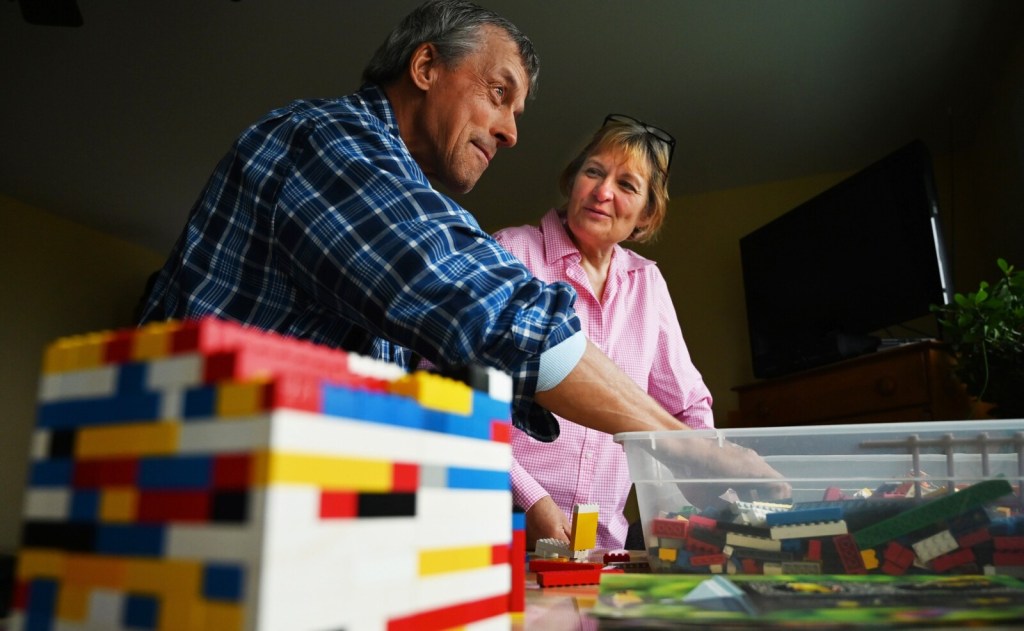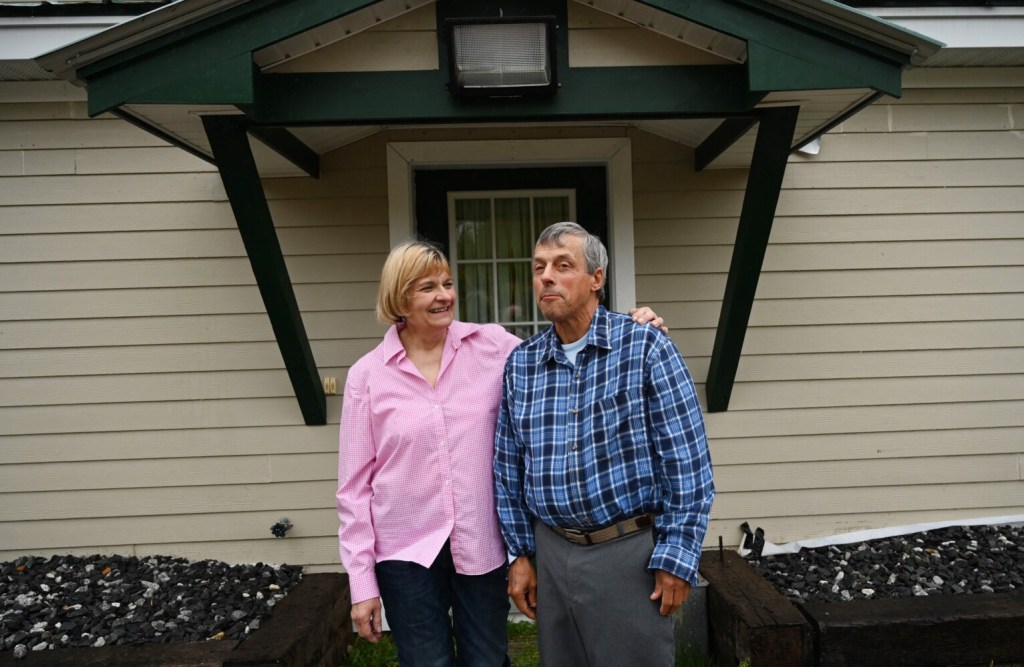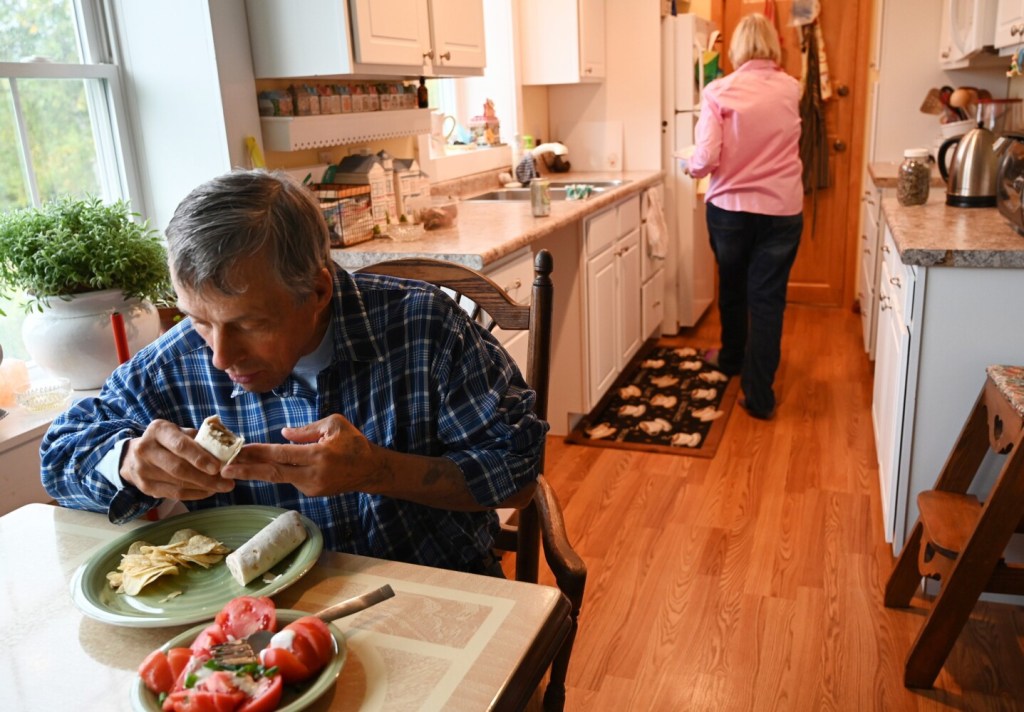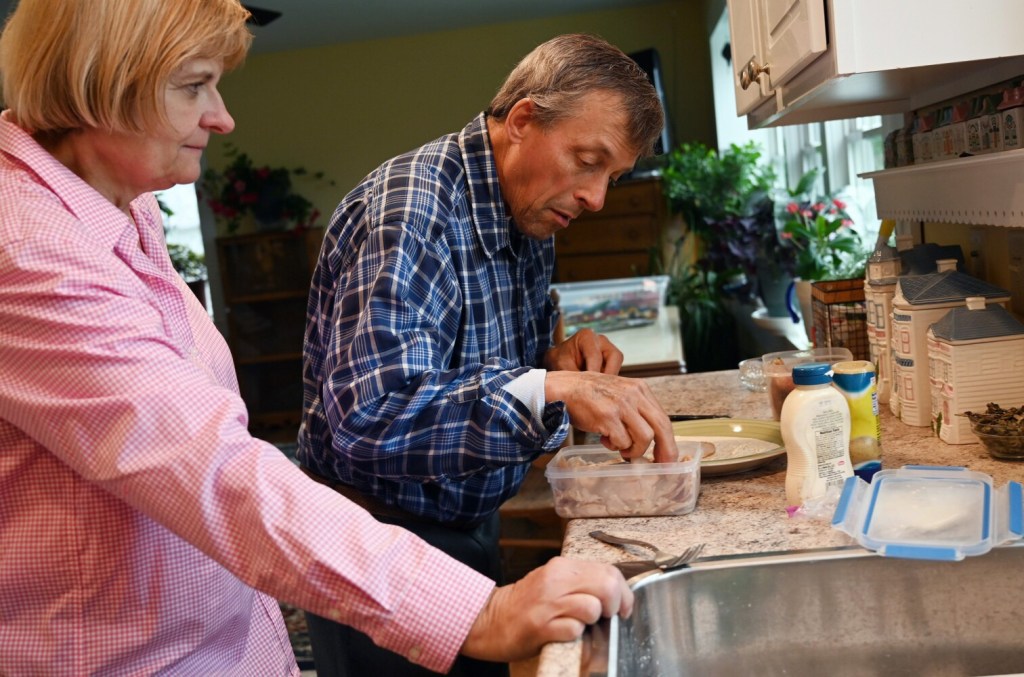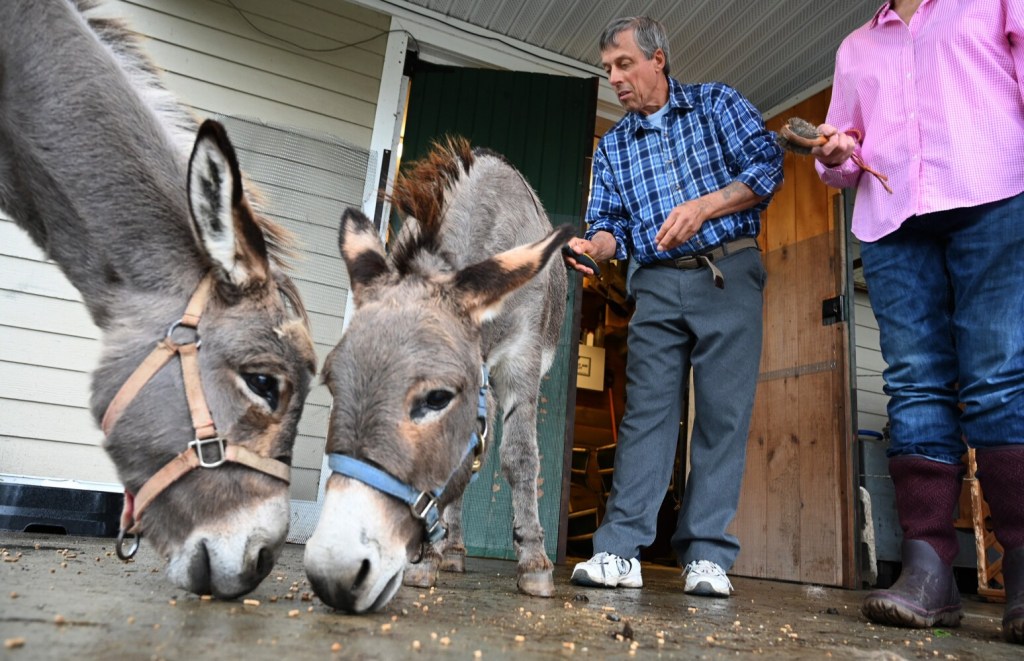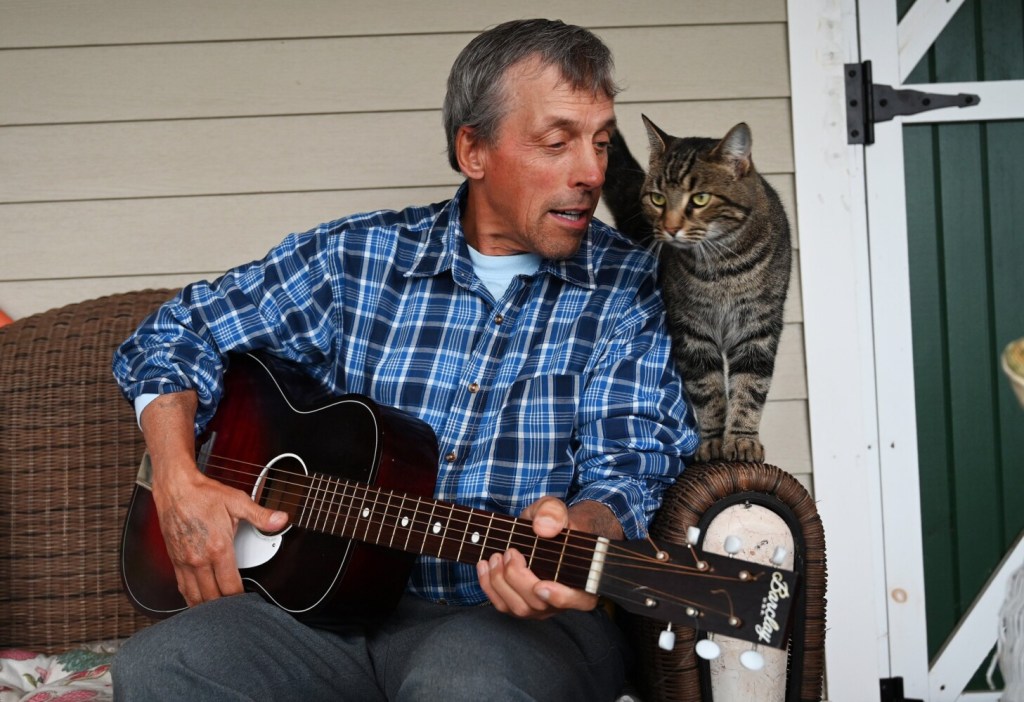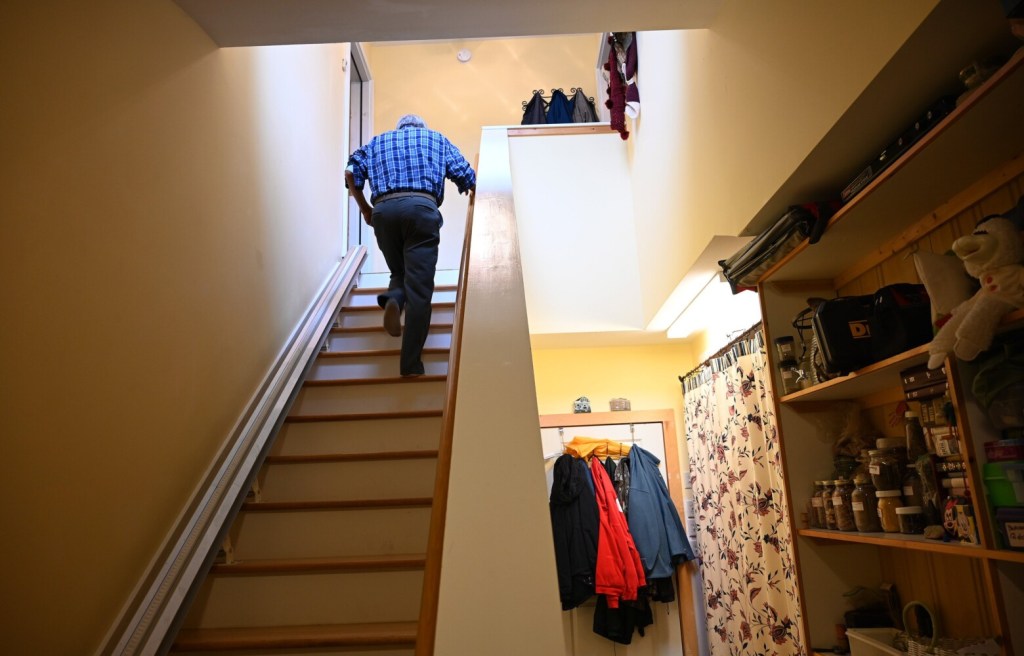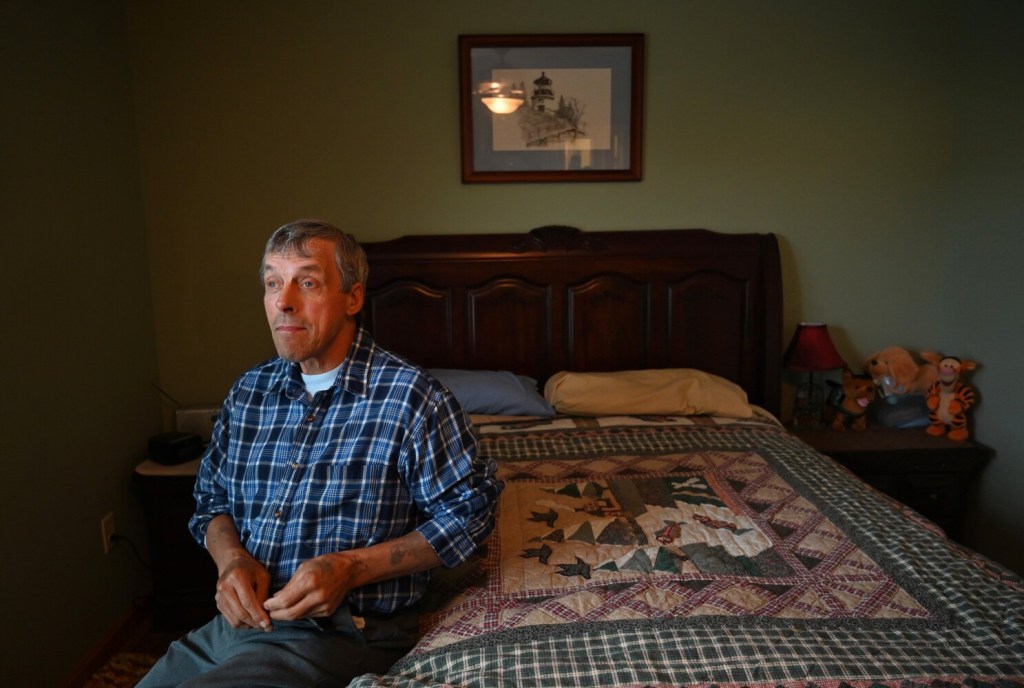BRIDGTON — From his home on the outskirts of town, David Noyes can walk freely through the backyard, where two miniature donkeys graze and where flowers and vegetables grow in neat rows.
Inside, he has a comfortable, tidy apartment – a bedroom, living room and galley-style kitchen – that affords him independence.
And, in an identical apartment next to his, he has Debbie Ogle, who has been pulling double duty as his legal guardian and primary caretaker since late 2017.
Noyes, 62, is legally blind and has lived with intellectual disabilities his whole life. For many years, he endured abuse and exploitation as well. He said he feels as safe and settled in Ogle’s home as anywhere he’s ever lived.
But that security is at risk because of a state rule that Ogle says is shortsighted and discriminatory. The rule is simple: She can be Noyes’ guardian, or she can be reimbursed for shared living services under Medicaid. But she can’t do both. Only a parent, sibling or other family member can do that.
Ogle, who would not provide her age, has been challenging the state unsuccessfully for nearly two years to bend its rules, and may be running out of chances. Her most recent appeal was denied and reimbursement ended in July. She had been receiving about $32,000 annually. Last month, the Department of Health and Human Services announced that it was seeking to amend its agreement with the federal agency that oversees Medicaid to ensure that the language matches state rules prohibiting non-blood relatives who are legal guardians from being reimbursed for shared living services.
The state doesn’t know how many people might be in the same situation as Ogle, or might like to be. That’s one of the reasons DHHS solicited public comments on the amendment last month. Those comments have not been released publicly, but department spokeswoman Jackie Farwell said 27 had been submitted as of last Thursday.

David Noyes pauses while playing his guitar as Debbie Ogle’s cat Kit Kat visits him on the porch of Ogle’s home in Bridgton last month. Shawn Patrick Ouellette/Staff Photographer
Ogle and Noyes each made forceful pleas that they also shared with the Portland Press Herald/Maine Sunday Telegram.
“The government told me I can stay here if I get another guardian,” he wrote. “I picked Debbie, and I want Debbie. They say no because she is not related to me. That is wrong. All of this is wrong.”
Lydia Dawson, executive director of the Maine Association for Community Service Providers, said her organization submitted comments asking the state to consider exceptions. She wrote that she doesn’t believe limiting reimbursements to only legal guardians who are biologically related meets the intent of the rule.
DHHS Commissioner Jeanne Lambrew said in an interview that the rule that prohibits Ogle from being reimbursed for services is not new and was designed to protect individuals against exploitation. She acknowledged that the state has continual challenges in providing care to this population and wants to be accommodating. However, while she would not address Ogle’s request directly, Lambrew said she doesn’t believe DHHS rules allow such an arrangement.
Disability Rights Maine, which serves as the state’s contracted advocacy organization for people like Noyes, also has declined to take his case.
“Under no circumstances would we represent someone who sought guardianship and also wanted to get paid,” said Kim Moody, the group’s executive director. “We want to work toward a world where guardianships are not needed.”
Disability Rights Maine has been pushing recently for something called supported decision-making, which dissolves adult guardianships and allows people to live with a level of independence that was unheard of a decade ago.
Ogle conceded that option might work for some, but she doesn’t believe it’s appropriate for Noyes. She said if the amendment goes through, she and Noyes will have three options: He can move out, likely into a group home, which he doesn’t want, and which would cost the state more money. She can dissolve guardianship, leaving Noyes without legal protection. Or she can provide his care for free, which she said no one should have to do.
Considering the state’s ongoing problems in providing care to adults with disabilities, exposed recently by the death of a 62-year-old man in Portland, Ogle said she doesn’t understand why it’s being so inflexible.
“The whole point of these programs is to make David’s life easier, to provide him with the least restrictive environment,” she said. “But that’s what he has now.”
SHARED LIVING
Until six years ago, Noyes had no legal guardian and no access to state services. He lived in Waldo County, first in a rundown family home, then in a trailer on the property. He worked for many years in fish processing but had to stop when his vision failed.
Ogle, who is retired and divorced with two adult children, has known Noyes’ family for years. She said she’s always had a soft spot for marginalized people. In high school, she said, she used to spend study halls with a girl named Denise who had intellectual disabilities. She said that relationship was formative.
In 2013, at the urging of one of his sisters, Ogle became Noyes’ guardian.
“He couldn’t take care of himself anymore and he was being taken advantage of,” said Louise Greenier of Ellsworth, Noyes’ younger sister. Greenier served as co-guardian with Ogle for a few years but withdrew because she has two adult children with autism who require most of her time and energy.
Greenier said Ogle was eager to advocate for David, and for two other brothers who have intellectual disabilities, because no one else could. For several years, Ogle was co-guardian of a woman in Bridgton who lives with Down syndrome, according to probate court records.
“She’s always been that way. I think she doesn’t want anyone to be mistreated,” Greenier said. “She’s the only one who has put in the energy.”
In her first guardianship plan filed with the probate court in Waldo County, Ogle wrote that Noyes would need daily support services in the home. It took several years for Noyes to even get services because the state initially said he wasn’t tested for intellectual disabilities early enough. Ogle helped rectify that, but that part of Noyes’ story is not unique.
Maine for years has struggled to properly care for these individuals. Nearly 3,200 Mainers live in group homes for the intellectually disabled and an additional 2,300 people get help within their own homes through Medicaid programs that were designed to replace institutions like the state-run Pineland Center, a residential facility in New Gloucester for adults with disabilities that closed in 1996 after decades of reports of abuse and neglect.
For many years after Pineland’s closure, Maine was considered a leader in replacing institutions with community services. Now, services are increasingly hard to access. More than 1,900 people are on a waiting list for home- or community-based programs. The most recent state budget included funding for an additional 167 people, but Lambrew said the focus on the waiting list doesn’t take into account the whole system. Two-thirds of those on waiting lists are receiving other services. Additionally, many on the waitlist for the more comprehensive set of services – known as Section 21 – are under the age of 21 and have applied in anticipation of aging out of youth services.
“Section 21 is the most expensive of services, so we’re always trying to assess whether those people need that level of support or whether their needs have changed,” Lambrew said.
Shared living has been promoted as an alternative to group homes. In its own manual, DHHS says shared living is “one of the least restrictive and most cost-effective options of home support services available in Maine” for adults with intellectual disabilities and autism spectrum disorder.
Noyes was finally offered shared living services in February 2016 and went to live with a provider on Verona Island. Almost immediately, he had issues with the provider, which were substantiated by an Adult Protective Service investigation. So Noyes asked Ogle if he could come live with her.
Ogle said she’d have to think about it, but she eventually agreed. In October 2017, she was approved as his shared living provider, which meant the state would reimburse her for providing his housing and care. Less than eight months later, though, the department realized it erred and denied a request to continue those reimbursements.
The letter from the state notifying Noyes that his benefits would be terminated wasn’t even signed.
Ogle, who would not say how much money she earns through retirement, said even if she could provide Noyes’ care without any reimbursement, that’s not the point.
“It’s not about me,” she said. “It’s about his benefits.”
‘GAPS IN THE SYSTEM’
Ogle began challenging the state’s decision immediately.
The state’s policy language is clear that “services provided directly or indirectly by the legal guardian will not be reimbursed unless the legal guardian is the member’s parent, sibling or other biological family member.” That rule went into effect in 2007.
The state’s agreement with Medicaid, however, does not explicitly prohibit the arrangement, something Ogle has pointed out several times during her fight.
Only recently did the state decide to remedy that, and only because of Noyes’ case.
Aaron Smith, a regional spokesman for the Centers for Medicare and Medicaid Services, said he couldn’t comment on the state’s intent to change its Medicaid agreement, other than to say the programs for providing services are designed to give states flexibility. He didn’t know if other states allow non-blood guardians to be reimbursed for shared living services.
Dawson, with the Maine Association for Community Service Providers, agreed with Ogle’s belief that non-biological guardians are no more or less likely to engage in fraudulent and abusive behavior, which is why the state established the restriction back in 2007.
“While we understand this is a relationship which requires higher scrutiny, we believe it can be created and monitored with respect to the individual circumstances and needs of the person receiving services,” Dawson wrote in her public comments.
Ogle also points to language in Maine’s probate code that says “a guardian of an incapacitated person has the same powers, rights and duties … that a parent has.” She also said a landmark 1999 U.S. Supreme Court decision, Olmstead vs. L.C., requires states to provide services to individuals with disabilities in the most integrated, and least restrictive, settings appropriate to their needs.
Ogle thought that’s where Disability Rights Maine would come in. But Moody, the advocacy organization’s director, said it wasn’t going to use resources to assist Ogle with her appeal.
“We have to ensure our limited public dollars are used in the most effective way,” Moody said. “We have tight priorities.”
The Legislature could intervene, or carve out an exemption, but Ogle has not gained any traction there. She’s been encouraged to hire an attorney and take the matter to court, but that would come at a substantial cost. So she’s had to go it alone.
Ogle said the state has told her she’s greedy, that she just wants the money. Greenier said she doesn’t believe Ogle would take advantage of her brother. And Ogle has argued that she’s saving the state money. Shared living services of about $32,000 per year cost far less than a group home, which would cost $150,000 or more, according to her estimates. Noyes also receives about $900 per month in Social Security disability payments that go toward his care.
Asked why she doesn’t just acquiesce and drop guardianship, Ogle said that might mean the state becomes Noyes’ guardian. She said the recent death of Norman Fisher, a ward of the state, is reason enough to avoid that. Fisher died in a small group home this summer after he failed to get insulin to treat his diabetes. The state terminated its contract with the provider, Residential and Community Support Services, after the company failed to make improvements following Fisher’s death.
Besides, Ogle said, as a guardian she has more accountability than if she were solely his service provider.
DHHS Commissioner Lambrew declined to discuss the specifics of Ogle’s request, or of Noyes’ care, but said she and her staff have been working to rebuild the system.
“As part of our longer-term view, we’re exploring pilot programs and supported housing options,” the commissioner said. “We don’t want to recreate AMHI (Augusta Mental Health Institute, the state’s former mental health hospital) or other larger institutional settings, but we are definitely looking at the full range of gaps in the system.”
For now, though, that doesn’t include making an exemption for Ogle and Noyes.
Noyes, meanwhile, said he has thrived in Ogle’s care. He participates in an adaptive ski program at Shawnee Peak and competed in the Special Olympics for the first time this year, in the equestrian carriage driving event. She helps with medications and doctor’s appointments and meals and hygiene. Why should she do that for free?
At his apartment, he can draw (even without his sight), play guitar and build with Legos. Maybe he’d have that somewhere else, but he wouldn’t have Ogle.
“She’s better than family,” he said.
Comments are not available on this story.
Send questions/comments to the editors.


